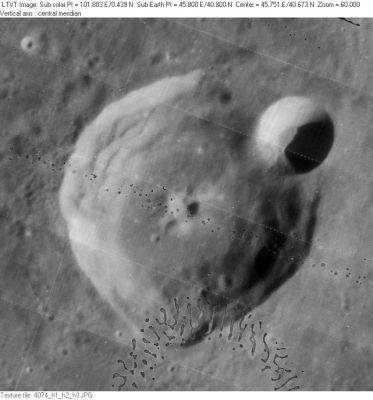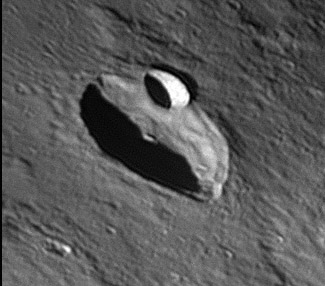Difference between revisions of "Cepheus"
| Line 6: | Line 6: | ||
|} | |} | ||
[http://www.lpod.org/coppermine/albums/userpics/normal_Cepheus_LO-IV-074H_LTVT.JPG [[Image:normal_Cepheus_LO-IV-074H_LTVT.JPG|external image normal_Cepheus_LO-IV-074H_LTVT.JPG]]][[Image:Cepheus_2006_04_16-Peach.jpg|external image Cepheus_2006_04_16-Peach.jpg]]<br /> '''Left''': ''[http://lpod.org/coppermine/displayimage.php?pos=-3034 LO-IV-074H]'' Overhead view from [[Lunar%20Orbiter|Lunar Orbiter]]. The 13-km diameter circular crater on '''Cepheus'''' northeast rim is '''Cepheus A'''. In addition to its central peaks, '''Cepheus''' appears to have a 5-km diameter depression (a relatively fresh impact crater?) at its center.<br /> '''Right''': ''[http://lpod.org/coppermine/displayimage.php?pos=-1547 Damian Peach, April 16, 2006]'' An Earth-based view showing a small peak to the northeast of '''Cepheus'''' center. This appears to be at the end of a ridge, common to the two photos and just north of the feature casting the strong westward shadow in the Lunar Orbiter view.<br /> <div id="toc"> | [http://www.lpod.org/coppermine/albums/userpics/normal_Cepheus_LO-IV-074H_LTVT.JPG [[Image:normal_Cepheus_LO-IV-074H_LTVT.JPG|external image normal_Cepheus_LO-IV-074H_LTVT.JPG]]][[Image:Cepheus_2006_04_16-Peach.jpg|external image Cepheus_2006_04_16-Peach.jpg]]<br /> '''Left''': ''[http://lpod.org/coppermine/displayimage.php?pos=-3034 LO-IV-074H]'' Overhead view from [[Lunar%20Orbiter|Lunar Orbiter]]. The 13-km diameter circular crater on '''Cepheus'''' northeast rim is '''Cepheus A'''. In addition to its central peaks, '''Cepheus''' appears to have a 5-km diameter depression (a relatively fresh impact crater?) at its center.<br /> '''Right''': ''[http://lpod.org/coppermine/displayimage.php?pos=-1547 Damian Peach, April 16, 2006]'' An Earth-based view showing a small peak to the northeast of '''Cepheus'''' center. This appears to be at the end of a ridge, common to the two photos and just north of the feature casting the strong westward shadow in the Lunar Orbiter view.<br /> <div id="toc"> | ||
| − | + | ||
| − | |||
==Images== | ==Images== | ||
[http://www.lpod.org/coppermine/thumbnails.php?album=search&type=full&search=Cepheus LPOD Photo Gallery] [http://www.lpi.usra.edu/resources/lunar_orbiter/bin/srch_nam.shtml?Cepheus%7C0 Lunar Orbiter Images] [http://www.lpi.usra.edu/resources/apollo/search/feature/?feature=Cepheus Apollo Images]<br /> | [http://www.lpod.org/coppermine/thumbnails.php?album=search&type=full&search=Cepheus LPOD Photo Gallery] [http://www.lpi.usra.edu/resources/lunar_orbiter/bin/srch_nam.shtml?Cepheus%7C0 Lunar Orbiter Images] [http://www.lpi.usra.edu/resources/apollo/search/feature/?feature=Cepheus Apollo Images]<br /> | ||
| Line 24: | Line 23: | ||
* Depth data from [[Kurt%20Fisher%20crater%20depths|Kurt Fisher database]] | * Depth data from [[Kurt%20Fisher%20crater%20depths|Kurt Fisher database]] | ||
** Westfall, 2000: 4.59 km | ** Westfall, 2000: 4.59 km | ||
| − | * From the shadows in [http://www.lpi.usra.edu/resources/lunarorbiter/frame/?4067 LO-IV-067H] and [http://www.lpi.usra.edu/resources/lunarorbiter/frame/?4074 LO-IV-074H], '''Cepheus A''' is 2710-2780 m deep. The shadow cast by the feature to the east of '''Cepheus'''' center spans a height range of a little over 800 m. This appears to be cast by a very low hill into the pit of a relatively fresh central crater; but the observed effect might conceivably be created by an arrangement of central peaks with irregular slopes. <span class="membersnap">- | + | * From the shadows in [http://www.lpi.usra.edu/resources/lunarorbiter/frame/?4067 LO-IV-067H] and [http://www.lpi.usra.edu/resources/lunarorbiter/frame/?4074 LO-IV-074H], '''Cepheus A''' is 2710-2780 m deep. The shadow cast by the feature to the east of '''Cepheus'''' center spans a height range of a little over 800 m. This appears to be cast by a very low hill into the pit of a relatively fresh central crater; but the observed effect might conceivably be created by an arrangement of central peaks with irregular slopes. <span class="membersnap">- Jim Mosher</span> |
* Satellite crater '''Cepheus A''' is on both the [[ALPO%20list%20of%20bright%20ray%20craters|ALPO list of bright ray craters]] and the [[ALPO%20list%20of%20banded%20craters|ALPO list of banded craters]] | * Satellite crater '''Cepheus A''' is on both the [[ALPO%20list%20of%20bright%20ray%20craters|ALPO list of bright ray craters]] and the [[ALPO%20list%20of%20banded%20craters|ALPO list of banded craters]] | ||
* TSI = 30, CPI = 15, FI = 20; MI =65 [[Smith%20and%20Sanchez%2C%201973|Smith and Sanchez, 1973]] | * TSI = 30, CPI = 15, FI = 20; MI =65 [[Smith%20and%20Sanchez%2C%201973|Smith and Sanchez, 1973]] | ||
| Line 34: | Line 33: | ||
* [[Johann%20Schr%C3%B6ter|Johann Schröter]] (in his [http://gallica2.bnf.fr/ark:/12148/btv1b2600117x.zoom.f3.langEN Plate VII]) labeled [[Franklin|Franklin]] as '''Cepheus austral.''' and called the present crater '''Cepheus boreal.'''. | * [[Johann%20Schr%C3%B6ter|Johann Schröter]] (in his [http://gallica2.bnf.fr/ark:/12148/btv1b2600117x.zoom.f3.langEN Plate VII]) labeled [[Franklin|Franklin]] as '''Cepheus austral.''' and called the present crater '''Cepheus boreal.'''. | ||
* By the time Mary Blagg's ''[[Collated%20List|Collated List]]'' was issued (1913) all three of her authorities used the names '''Cepheus''' and '''Cepheus A''' with their modern meanings. | * By the time Mary Blagg's ''[[Collated%20List|Collated List]]'' was issued (1913) all three of her authorities used the names '''Cepheus''' and '''Cepheus A''' with their modern meanings. | ||
| − | * The names '''Cepheus''' and '''Hercules''' are the only two in the gazetteer of official lunar nomenclature which are also the names of constellations in the celestial northern hemisphere.<span class="membersnap">- | + | * The names '''Cepheus''' and '''Hercules''' are the only two in the gazetteer of official lunar nomenclature which are also the names of constellations in the celestial northern hemisphere.<span class="membersnap">- DannyCaes <small>Apr 25, 2010</small></span> |
<br /> | <br /> | ||
==Cepheus E or Cepheus Epsilon?== | ==Cepheus E or Cepheus Epsilon?== | ||
| − | * [http://the-moon.us/wiki/SLC-B2 SLC-B2] shows some sort of mountain or hill about halfway between '''Cepheus''' and '''Maury'''. It is labeled "'''E'''" with and arrow pointing toward '''Cepheus'''. The ''ACT-REACT Quick Map'' of the LROC site doesn't show an "'''E'''" at that location, or'''...''' should it be '''Epsilon'''? ('''Cepheus Epsilon'''?). <span class="membersnap">- | + | * [http://the-moon.us/wiki/SLC-B2 SLC-B2] shows some sort of mountain or hill about halfway between '''Cepheus''' and '''Maury'''. It is labeled "'''E'''" with and arrow pointing toward '''Cepheus'''. The ''ACT-REACT Quick Map'' of the LROC site doesn't show an "'''E'''" at that location, or'''...''' should it be '''Epsilon'''? ('''Cepheus Epsilon'''?). <span class="membersnap">- DannyCaes <small>Feb 12, 2017</small></span> |
* Chart 21 in the ''Times Atlas of the Moon'' shows, at that location, a rather large non-circle shaped region called '''Cepheus E'''. | * Chart 21 in the ''Times Atlas of the Moon'' shows, at that location, a rather large non-circle shaped region called '''Cepheus E'''. | ||
<br /> | <br /> | ||
| Line 46: | Line 45: | ||
<br /> <br /> | <br /> <br /> | ||
---- | ---- | ||
| − | + | </div> | |
Revision as of 16:17, 15 April 2018
Contents
Cepheus
|
Lat: 40.8°N, Long: 45.8°E, Diam: 39 km, Depth: 4.59 km, Rükl: 15, Eratosthenian |


Left: LO-IV-074H Overhead view from Lunar Orbiter. The 13-km diameter circular crater on Cepheus' northeast rim is Cepheus A. In addition to its central peaks, Cepheus appears to have a 5-km diameter depression (a relatively fresh impact crater?) at its center.
Right: Damian Peach, April 16, 2006 An Earth-based view showing a small peak to the northeast of Cepheus' center. This appears to be at the end of a ridge, common to the two photos and just north of the feature casting the strong westward shadow in the Lunar Orbiter view.
Images
LPOD Photo Gallery Lunar Orbiter Images Apollo Images
- Lunar orbiter stereo view
Maps
(LAC zone 27A3) LAC map Geologic map
Description
Description: Elger
(IAU Directions) CEPHEUS.--A peculiarly shaped ring-plain, 27 miles in diameter. The W. border is nearly rectilineal, while on the E., the wall forms a bold curve. There is a very brilliant crater on the summit of this section, and a central mountain on the floor. The E. wall is much terraced. E. of Cepheus, close to the brilliant crater, there is a cleft or narrow valley running N. towards Oersted.
Description: Wikipedia
Additional Information
- Depth data from Kurt Fisher database
- Westfall, 2000: 4.59 km
- From the shadows in LO-IV-067H and LO-IV-074H, Cepheus A is 2710-2780 m deep. The shadow cast by the feature to the east of Cepheus' center spans a height range of a little over 800 m. This appears to be cast by a very low hill into the pit of a relatively fresh central crater; but the observed effect might conceivably be created by an arrangement of central peaks with irregular slopes. - Jim Mosher
- Satellite crater Cepheus A is on both the ALPO list of bright ray craters and the ALPO list of banded craters
- TSI = 30, CPI = 15, FI = 20; MI =65 Smith and Sanchez, 1973
Nomenclature
- Named for Cepheus, a Greek mythological astronomer, ruler of the Phoenician nation of Aethiopia and the father of Andromeda.
- According to Whitaker (p. 211), the name Cepheus was introduced on Riccioli's map (from which much of the original IAU nomenclature derives), however the feature so-designated was what we now call Franklin. The present crater was not named on Riccioli's map.
- Johann Schröter (in his Plate VII) labeled Franklin as Cepheus austral. and called the present crater Cepheus boreal..
- By the time Mary Blagg's Collated List was issued (1913) all three of her authorities used the names Cepheus and Cepheus A with their modern meanings.
- The names Cepheus and Hercules are the only two in the gazetteer of official lunar nomenclature which are also the names of constellations in the celestial northern hemisphere.- DannyCaes Apr 25, 2010
Cepheus E or Cepheus Epsilon?
- SLC-B2 shows some sort of mountain or hill about halfway between Cepheus and Maury. It is labeled "E" with and arrow pointing toward Cepheus. The ACT-REACT Quick Map of the LROC site doesn't show an "E" at that location, or... should it be Epsilon? (Cepheus Epsilon?). - DannyCaes Feb 12, 2017
- Chart 21 in the Times Atlas of the Moon shows, at that location, a rather large non-circle shaped region called Cepheus E.
LPOD Articles
Bibliography